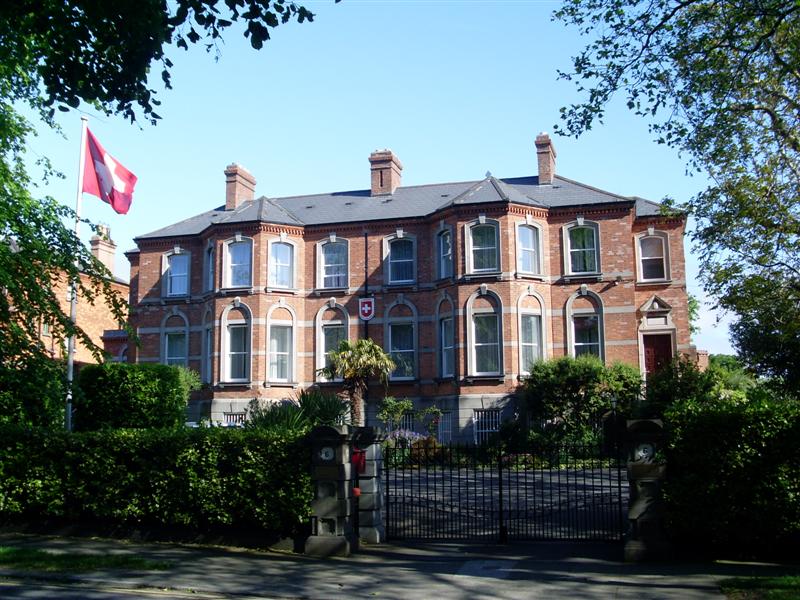
Five more consulates to disappear

Swiss living in Uruguay, Paraguay, Ireland, Malaysia and Portugal will this year have to turn to other countries for their consular services.
The Swiss foreign ministry has decided to close those sections at the embassies in Montevideo, Asunción, Dublin, Kuala Lumpur and Lisbon during 2012.
Their services will be transferred to the regional consular centres of Buenos Aires, London, Bangkok and Madrid.
The measure is part of a restructuring of the Swiss diplomatic network introduced last year, in which activities will be concentrated in regional consular centres and resources transferred to emerging countries.
Around 7,600 Swiss passport holders live in the five countries affected by the latest move, or around one per cent of the total population of Swiss living abroad.
Resources
“The concentration of services in regional consular centres allows for synergies and increased efficiency, while at the same time freeing resources for other needs,” the foreign ministry said in an email, underlining the fact that it was not a “closure” but a “transfer of services”.
The foreign ministry intends to use the freed-up resources for a new embassy in Doha, Qatar, and for strengthening visa-issuing services in countries which are seeing a steep rise in tourists wanting to visit Switzerland. These include China and India, where consulate officials are struggling to keep up with demand.
“To guarantee the optimum public service during times of limited financial resources, needs and services have to be continuously evaluated and, where necessary, adapted,” wrote the foreign ministry, which does not rule out further transfers in services.
The Organisation of the Swiss Abroad (OSA) – which was not consulted by the foreign ministry – is not at all happy about the restructuring.
On April 8, 2011, the Council of the Swiss Abroad, meeting in Brunnen, gained a large majority for a resolution calling for a quality consular network to be maintained.
Adequate measures?
Ariane Rustichelli, head of OSA communications, said that closures and concentrations of services often left Swiss abroad facing a longer trek for consular services.
“Swiss living in Croatia have to go to Vienna to sort out administrative problems or get a biometric passport. This is not acceptable. We need to maintain a quality consular network for our compatriots abroad,” she said.
According to the foreign ministry, most tasks can now be carried out by post or electronically. In addition, a helpline (0800 247 365) has been set up for those in countries affected by consulate closures. It will soon be in operation 24 hours a day and 365 days a year.
Mobile consulates have been set up to take data for biometric passports and the foreign ministry is collaborating with other countries which have signed up to the Schengen agreement over the issuing of visas.
Swiss abroad relations
The ministry added that the experiences of the past few years had been “promising”.
The OSA is not against mobile solutions and is one of the most fervent supporters of boosting e-government. And where consulate closures cannot be avoided, the OSA is calling for honorary consuls with more powers.
But the OSA says the solutions adopted until now are clearly insufficient.
Mobile consulates are “only used exceptionally, as the delegate for Swiss abroad relations, Jean-François Lichtenstern, has confirmed. This causes problems for issuing biometric passports”, observed Rustichelli.
“It has to be said, therefore, that these measures are often not yet operational and cannot replace in every case a good consular service that is nearby.”
In general, issues have been raised about the political tack taken over the past years. “This raises questions about the relations Switzerland wants to have with its expat citizens, who represent ten per cent of the population,” Rustichelli said.
Switzerland has 93 embassies, 12 missions attached to international organisations and 41 general consulates – comparable numbers to countries of a similar size.
The resources of these representations are much reduced. Four-fifths of them comprise not more than two diplomatic staff, apart from the ambassador, and often cover neighbouring countries. Numerous embassies operate with just one diplomat.
The consulates play a role similar to communal administration for Swiss based in or passing through a particular country. They can issue official documents, such as passports and identity cards and assist citizens in exercising their electoral rights, with questions of nationality and marital status. They also increasingly help Swiss tourists in difficulty, provide consular protection services and help people who have lost their identity documents.
(Source: Swiss foreign ministry)
(Translated from French by Isobel Leybold-Johnson)

In compliance with the JTI standards
More: SWI swissinfo.ch certified by the Journalism Trust Initiative
















![The four-metre-long painting "Sonntag der Bergbauern" [Sunday of the Mountain Farmers, 1923-24/26] had to be removed by a crane from the German Chancellery in Berlin for the exhibition in Bern.](https://www.swissinfo.ch/content/wp-content/uploads/sites/13/2025/12/01_Pressebild_KirchnerxKirchner.jpg?ver=bb19e376)















You can find an overview of ongoing debates with our journalists here . Please join us!
If you want to start a conversation about a topic raised in this article or want to report factual errors, email us at english@swissinfo.ch.